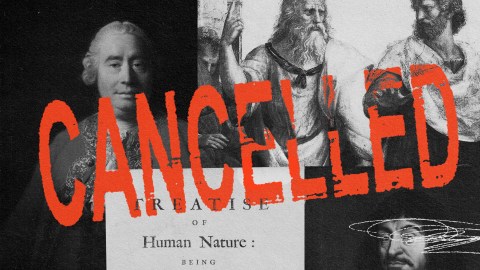“Kantcelling” philosophers: Should we study thinkers with problematic views?

- Most philosophy curriculums around the world feature thinkers who were racists, sexist, or imperialists.
- "Conceptual isolation" is a term for when we can look at one area of a thinker's works without endorsing others.
- This is easy to do in some areas of philosophy, but problematic in areas like politics or ethics.
Martin Heidegger was a Nazi. He was not a Nazi in the “I dislike his views” kind of way; he was a card-carrying and loyal member of the German National Socialist Party. You can find highly antisemitic statements in the notebooks he kept from 1930 to 1940. And yet, Heidegger is still considered one of the most significant continental philosophers of the 20th century. Jean-Paul Sartre, who was vehemently anti-Nazi, idolized Heidegger’s ideas. Sartre’s magnum opus, Being and Nothingness, is an homage to Heidegger’s Being and Time. Sartre, a member of the Paris resistance, loved Heidegger: a Nazi. Was he wrong to do so?
The problem is not limited to Heidegger. Aristotle was racist and sexist, and he defended slavery. David Hume argued that black people are naturally inferior to whites. Gottlob Frege made antisemitic comments, and Wittgenstein was unashamedly forthright in his sexist ones. Recently, it was Kant’s turn to be exposed. It’s unsurprising, given that the German once wrote, “Humanity has achieved its greatest perfection in the white race.” In various essays, Kant repeats and returns to various distasteful and unarguably racist views.
That’s six of the biggest names in philosophy, each with more than enough evidence with which to hang them. If we look only a little bit deeper, Plato (sexist), René Descartes (tortured animals), John Locke (invested in the slave trade), Jean-Jacques Rousseau (also sexist), Voltaire (slavery again), G.W.F. Hegel (racist), Thomas Jefferson (slavery and racism), and Friedrich Nietzsche (antisemitic) all have a Halloween party’s worth of skeletons in their closet.
So, how are we to go on doing philosophy when the entire syllabus has been redacted or blacklisted? Can we “cancel” a person who died two centuries years ago? Should we?
Conceptual isolation
Michael B. Gill is a philosopher at Edinburgh University, a university grappling with “What to do about Hume?” Gill has limited sympathy for canceling important philosophers. But that doesn’t mean he thinks the answer is to ignore the problematic things those philosophers said. Instead, Gill argues for something called conceptual isolation. Conceptual isolation is where “Philosophers’ racist views may not infect all their philosophical conclusions.” When we talk about the history of science, it seems ridiculous to discount the findings of Galileo, Newton, or Euler, because they, too, had problematic prejudices. We treat science without the scientists. Why not do the same with philosophers?
Let’s take Hume as an example. Hume’s critique of causality, religion, and ethics are some of the most persuasive, well-argued philosophical arguments, and we still grapple with them today. As Gill argues, they are “free of the infection of Hume’s anti-black racism,” as much as “astronomy, physics, and mathematics.” Philosophy, like these other disciplines, concerns arguments and reason. So, at least sometimes, it’s fair to deal only with the ideas and not the person.
None of this is to ignore, downplay, or hide various philosophers’ prejudices. Gill talks about the “division of labor” within academia. One scholar can write about Hume’s causation while another can write about his racism. One philosopher can spend a lifetime defending Aristotelian virtue ethics, while another can showcase the darker side of ancient Greek philosophy. Doing philosophy doesn’t excuse the philosopher, and there’s more than enough philosophy to go around.
When the infection spreads
Of course, the great thing about philosophy is that it is not solely concerned with a priori truths, logical axioms, or rational conclusions. It’s about politics and ethics. It’s about what it means to be a human being. Heidegger’s work is all about the everyday human experience, for example. And when you’re dealing with these kinds of things, it’s not so easy to ringfence a philosopher’s opinion elsewhere in their works. We can look at two examples: John Locke and Immanuel Kant.
Locke wrote extensively about property rights. For Locke, when you “mix your labor” (i.e., cultivate) with some land, it becomes a part of you. Therefore, you have a right to that land. Locke’s philosophy is about land ownership, property rights, and the rule of law. In short, it’s a universalized version of 17th-century England. Here, though, we cannot disregard Locke’s racist views. If you believe, as he did, that non-Europeans are naturally inferior to white Europeans, when you encounter their views, you will be inclined to disregard them. So, when the native Americans failed to cultivate their land in the same way the British colonists did, Locke felt no compunction in saying, “Well, this land doesn’t belong to you.” Locke’s racism can’t be detached from his philosophy.
So, too, with Kant. Kant wrote extensively about cosmopolitanism. He argued for a “brotherhood of nations” and a “federation of republics” based on respect, reason, and free trade. In this world, there would be no wars since everyone would soon realize the costs of war far outweigh the benefits. That all sounds great. That is until you consider his views on white superiority. When Kant argues Africans are born into manual labor and slavery, you wonder what place they take in his brotherhood of nations. When he claims that Europeans are intellectually and morally superior to all other races, you do wonder about who sits at the table of his “federation of republics.”
Warts and all
So, as always with philosophy, it’s complicated. Philosophy, as a discipline, straddles the divide between science and humanity. At times, it looks like abstract theory. At other times, it’s about the hearts and minds of everyday people. So, it’s hard to conclude either way about how far we should disregard a person’s prejudices (in fact, there are often good reasons to do so).
What we should not do is “cancel” any philosophy. We shouldn’t bowdlerize philosophers’ works or strike these important names from the curriculum. It’s likely impossible, anyway. Philosophy is rarely isolated to one name, and philosophers’ ideas will not stop with their death (or cancellation). Kantian ideas are everywhere. They have “infected” almost all continental philosophy since he wrote his great works. Much better, instead, to recognize the brilliant stuff while calling out the reprehensible. If philosophy is to carry on at all, as with almost all humanities, we have to look at thinkers, warts, and all.





